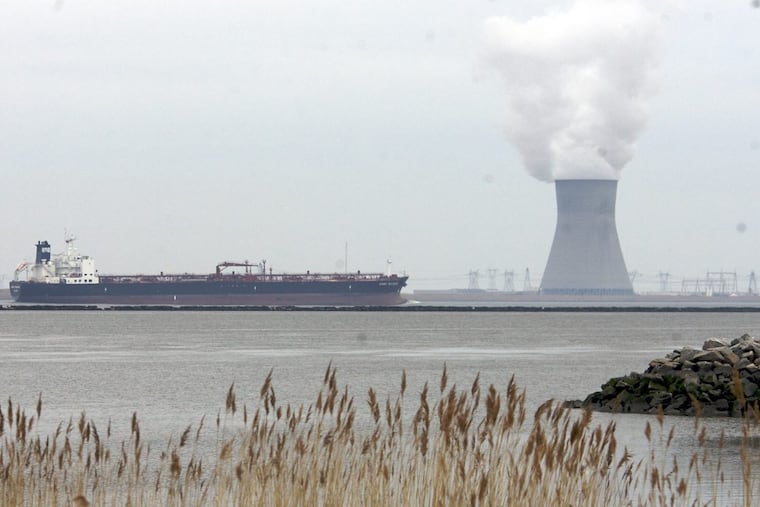New Jersey approves $300 million in nuclear subsidies; PSEG had threatened to close reactors
The NJ Board of Public Utilities approved new zero-emission credits for the Salem and Hope Creek nuclear plants. NJ customers will pay more. PSEG, which owns 71 percent of the plants, will benefit.

With the state’s nuclear reactors under imminent threat of closure, New Jersey regulators on Thursday voted to approve $300 million in ratepayer subsidies to benefit nuclear power generators, primarily benefiting Newark-based PSEG.
The New Jersey Board of Public Utilities (BPU) voted 4-1 Thursday to approve new zero-emission credits for the Salem and Hope Creek power stations in South Jersey. The approval comes two days after PSEG, the plant operator that lobbied lawmakers to approve the subsidy last year, notified authorities that without state support it planned to close the reactors beginning this fall.
The subsidy amounts to 0.4 cents per kilowatt hour, or about $4 more on the bill of a residential customer using 1,000 kWh monthly.
New Jersey’s ratepayer advocate and environmental activists had argued that PSEG had failed to establish that its plants in Lower Alloways Township, Salem County, face financial peril, as required under the zero-emission credit law.
“The BPU sold out the ratepayers and renewable energy today by going along with this unnecessary nuclear subsidy," Jeff Tittel, director of the New Jersey Sierra Club, said in a statement. "This giveaway is about greed and not need.“
PSEG, which separately owns New Jersey’s largest utility, Public Service Electric & Gas Co., maintained that the plants were disadvantaged compared with low-cost natural gas generators and with subsidized solar and wind producers. Supporters of nuclear rescues argue that the closure of reactors would lead to higher electricity costs, as well as the loss of jobs and zero-carbon emissions associated with nuclear plants.
“The BPU just saved the people of the state hundreds of millions of dollars in what would have been higher energy costs, thousands of jobs lost, and tons of environmentally damaging air emissions,” PSEG said in a statement. More than a hundred PSEG employees, wearing orange T-shirts, attended the BPU’s meeting in Trenton on Tuesday.
New Jersey, New York, Illinois, and Connecticut have approved subsidies to the embattled nuclear industry, which says seven reactors have closed prematurely since 2013 because they could not complete in low-cost energy markets, and a dozen more reactors have announced planned early retirements.
“The risk of closure is real,” Maria Korsnick, president of the Nuclear Energy Institute, told New Jersey regulators last year. “We are seeing it play out in slow motion across the region.”
Pennsylvania, Ohio, and Maryland are also considering rescues. The legality of such programs was affirmed Monday when the U.S. Supreme Court declined to take up challenges to the New York and Illinois subsidies.
PSEG said the timing of its notice Tuesday to the regional grid operator, PJM Interconnection, that it would begin closing its New Jersey reactors this fall was “coincidental” to the board’s vote and was dictated by an April 16 deadline to notify PJM that the plants would be unavailable to the power grid in the near future.
PSEG owns all of the single-unit Hope Creek Generating Station, which can produce 1,172 megawatts of electricity. It owns 57 percent of the older Salem Nuclear Generating Station. Exelon Generation owns a minority share of the twin-unit Salem plant, which can produce 2,327 MW.
Exelon has been deeply involved with promoting nuclear rescue bills in Illinois and New York and is leading a contentious effort in Pennsylvania to pass a $500 million nuclear subsidy.
New Jersey’s nuclear-subsidy program differs structurally from the proposal in Pennsylvania. Both programs require subsidized generators to demonstrate an environmental benefit to their states. But New Jersey’s specifically requires the power producer to establish a financial need. The authors of Pennsylvania’s legislation say they wanted to steer clear of a means test to avoid accusations that the subsidy amounts to a “bailout.”
The Board of Public Utilities had the legal authority to determine that no plants are eligible for subsidies. Supporters of the nuclear subsidies argued that they are similar to the renewable-energy certificate programs that New Jersey has established for solar and offshore wind generation.